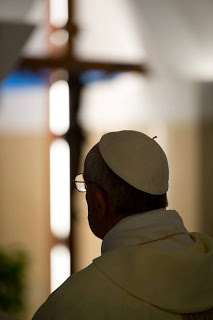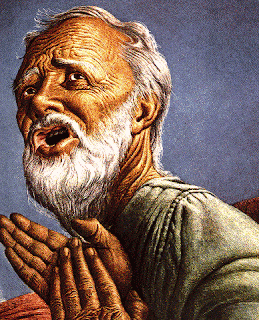 Over the past years several people have written me about their desire to become a diocesan hermit in order to be allowed to reserve Eucharist in their own living space. Most striking about three of these emails was the clear sense that diocesan eremitical life per se held no interest for the person apart from this privilege, and indeed, were the ability to reserve Eucharist in their own living spaces withheld by the diocesan Bishop one person said honestly but bluntly, "What is the point of being consecrated?" It is a good question (for there IS a point!), but it also likely says the person posing the question is not called to diocesan eremitical life at this point in time --- if at all. The following is an accurate characterization of the questions I have received from the three posters referenced compiled as though from a single correspondent.
Over the past years several people have written me about their desire to become a diocesan hermit in order to be allowed to reserve Eucharist in their own living space. Most striking about three of these emails was the clear sense that diocesan eremitical life per se held no interest for the person apart from this privilege, and indeed, were the ability to reserve Eucharist in their own living spaces withheld by the diocesan Bishop one person said honestly but bluntly, "What is the point of being consecrated?" It is a good question (for there IS a point!), but it also likely says the person posing the question is not called to diocesan eremitical life at this point in time --- if at all. The following is an accurate characterization of the questions I have received from the three posters referenced compiled as though from a single correspondent.
[[Dear Sister, I would like to reserve the Eucharist in my own home. I live alone and I attend adoration when I can. It is really pivotal to my own spirituality. I am discerning a vocation as a diocesan hermit so that I can do that and I am pretty sure that I am called to this. From what you have written though, I understand that my Bishop does not have to grant me this right [to reserve Eucharist]. So here're my questions: What would be the point of becoming consecrated if my Bishop was NOT going to grant this right? Why not just continue to live as I am already? Also, isn't the right to reserve Eucharist critical to discerning such a vocation? Shouldn't those discerning such a vocation be allowed to reserve Eucharist before they are professed/consecrated?
 Further, wouldn't I be kind of "stuck" if a new Bishop took this right away from me? Personally I feel if that happened it would be devastating to my vocation. I know that obedience is important and I don't mean that I would be disobedient to my Bishop; however, I want to be obedient to the will of God and I think that reserving Eucharist is God's will for me. After all, who are we serving? I love the Lord in the Eucharist; I experience God flooding my being with his presence during adoration sometimes and having Him in my private chapel apart from distractions and noise by other people is absolutely necessary to my becoming consecrated. I imagine this is true for any consecrated hermit, isn't it? ]]
Further, wouldn't I be kind of "stuck" if a new Bishop took this right away from me? Personally I feel if that happened it would be devastating to my vocation. I know that obedience is important and I don't mean that I would be disobedient to my Bishop; however, I want to be obedient to the will of God and I think that reserving Eucharist is God's will for me. After all, who are we serving? I love the Lord in the Eucharist; I experience God flooding my being with his presence during adoration sometimes and having Him in my private chapel apart from distractions and noise by other people is absolutely necessary to my becoming consecrated. I imagine this is true for any consecrated hermit, isn't it? ]]
Thanks for your questions. I am afraid that given what you have written about your reasons for embracing an eremitical vocation, and especially a consecrated form of that, your question "why not continue to live as [you already are]?" is pretty much my own question to you. What I hear you saying to me is simply that you want to reserve Eucharist and that you will seek and accept consecration as a diocesan hermit if that is allowed you, but there is no point in doing so otherwise; that is, you really see no point to living as a diocesan hermit or embracing the rights and obligations associated with this public vocation in the Church otherwise. As significant as devotion to the reserved Eucharistic presence may be for a person (I say "may" for it may also be unhealthy, theologically unsound, and destructive) and as significant as it is for you personally, it is not a sufficient reason to live an eremitical life much less seek or be admitted to consecration in this way. Similarly it may actually suggest that one is not a suitable candidate for either eremitical life generally or for consecration under canon 603 more specifically. Let me try to explain.
Reservation of Eucharist is a privilege; it is not essential to eremitical life:
While you may imagine that what you feel and believe is and would be true for any consecrated hermit, it is simply not the case. The privilege of reserving Eucharist is not an absolute right and, in fact, is not even typical of the eremitical tradition. Only rarely have hermits been able to reserve Eucharist in their hermitages; it is a distinctly modern development and is still not universally practiced. Not all diocesan hermits are granted this right and some personally feel no need for it (or they may feel they don't have adequate space for it given the simplicity of their living arrangements). Most religious hermits also live without this privilege (it is typical of the Carthusians and Camaldolese to live in cells without Eucharist reserved). I am sure you would agree nonetheless that there is a point to their lives and that the presence of God in their cells is undoubted.
Eremitical life has generally been lived in both the Eastern and Western Church for almost 2000 years without the privilege of reservation of the Eucharist by individual hermits. If this is truly the reason you are seeking consecration, that is, if this is really absolutely vital to your being consecrated, then I believe you have missed something critical about this vocation. Let me suggest that, for instance, you may not yet be sufficiently appreciative of the ecclesiality of the vocation or of the other ways God dwells with the hermit (or the hermit with God) and the ways the hermit is called to give witness to these realities. Similarly, you may not be open to the loneliness and paradoxical experience of God's presence which is not tied to a literal tabernacle and sometimes feels like an absence. Dealing with this is part and parcel of the eremitical life and of the witness it is called and commissioned to offer both Church and world.
For instance, while the Celebration of the Eucharist and its extension to the hermitage through the reserved Eucharist is central to my own life and to the ecclesial sense of this vocation, and while I would need to change some of the ways I pray were the privilege of reserving it revoked ---especially on days I do not attend Mass --- that revocation would not adversely affect the quality of my prayer or my sense that God is with me as he is in the Eucharist --- in Scripture, in contemplative prayer, in my solitary meals, etc. Neither would it diminish my sense that I live this vocation both for the sake of others and empowered by them and their love and prayers as well (again, part of what I have been calling the ecclesial sense of this vocation). The Eucharistic presence is significant, of course, and it symbolizes all of these things. I emphatically do not mean to minimize that, but my hermitage is and is meant to be a tabernacle of the Risen Christ whether or not I am also allowed to reserve Eucharist here. This is true, I would suggest, for any consecrated hermit and again, is part of the public witness they are called on to give those others who have no chance of reserving the Eucharist in their own spaces but who are also called to recognize and realize their own lives as instances of Eucharistic presence and as places where that presence can become manifest in everyday moments and activities.
Neither is Reservation of Eucharist Essential to the Candidate's Discernment Process
I say this because unless a person can live with God in THIS way they may not be called to eremitical solitude at all. Instead, their physical solitude may be a form of illegitimate isolation and their desire to reserve the Eucharist a form of privatistic devotion which is actually a betrayal 1) of the vocation's ecclesiality, 2) of the nature of eremitical solitude, and 3) of the very nature of Eucharist itself. (cf, Notes From Stillsong Hermitage: Narcissism and Exaggerated Individualism, or Notes From Stillsong Hermitage: Ecclesiality vs Individualistic Devotional Acts) In a little-understood vocation fraught with stereotypes related to selfishness, narcissism, and misanthropy and with regard to a canon which has already been abused in merely stopgap solutions for those who cannot be consecrated in any other way, it is important that candidates for profession be models of significant ecclesiality or communion, generosity, love for and witness to others.
 The fact that you ask "what would be the point?" regarding consecration as a diocesan hermit in the face of lack of permission or revocation of permission to reserve Eucharist in your own space again suggests to me you do not yet truly sufficiently understand nor value the nature of consecrated eremitical life or the witness it gives to so very many whose isolation can and must be redeemed by the presence of God in their physical solitude. A hermit knows this because she has actually been formed in solitude usually without the privilege of reservation. The hermit finds God in ALL the ways God is present, and all the ways every person is called on to find God and she does this not only because she is called to do it, but because it is a central redemptive truth and possibility anyone in the consecrated state must clearly witness to. There is a significant "point" to eremitical life and communion with God is certainly pivotal to that; however, reservation of the Eucharist is NOT absolutely necessary for achieving this communion and may even be an obstacle to it for some, especially if it makes of solitude an instance of isolation and Eucharist a mainly privatistic indulgence.
The fact that you ask "what would be the point?" regarding consecration as a diocesan hermit in the face of lack of permission or revocation of permission to reserve Eucharist in your own space again suggests to me you do not yet truly sufficiently understand nor value the nature of consecrated eremitical life or the witness it gives to so very many whose isolation can and must be redeemed by the presence of God in their physical solitude. A hermit knows this because she has actually been formed in solitude usually without the privilege of reservation. The hermit finds God in ALL the ways God is present, and all the ways every person is called on to find God and she does this not only because she is called to do it, but because it is a central redemptive truth and possibility anyone in the consecrated state must clearly witness to. There is a significant "point" to eremitical life and communion with God is certainly pivotal to that; however, reservation of the Eucharist is NOT absolutely necessary for achieving this communion and may even be an obstacle to it for some, especially if it makes of solitude an instance of isolation and Eucharist a mainly privatistic indulgence.Bishops know this and my own experience is that they allow reservation of the Eucharist only as PART of a rich and varied life where God's presence is perceived and celebrated in all the ways it is real. They are aware that the reservation of the Eucharist must never be isolating (again, solitude and isolation are very different things), never cut off from the whole People of God or fail to be a true extension of her Eucharistic liturgy, never merely a privatistic act and certainly not an elitist or selfish one. Permission is given when reservation is a piece of a healthy Sacramental theology which sees every meal in the hermitage as a continuation of Eucharist with the hermit's local community, every interchange with others as an exchange of the kiss of peace, and so forth. Reservation of Eucharist is allowed because in a life of eremitical solitude it calls for and can nourish this kind of spirituality which serves the hermit and whole People of God. Ironically, for a hermit to actually learn these things and live them fully as part of a profoundly ecclesial vocation, it may be important to withhold permission to reserve Eucharist in the hermitage. (cf: Notes From Stillsong: On Reservation of the Eucharist and, Notes From Stillsong Hermitage: On Hermits and Eucharistic Spirituality, Notes From Stillsong Hermitage: Ecclesiality vs Individualistic Devotional Acts for more on Eucharistic Spirituality and the dangers of privatistic or individualistic devotional practice in its regard.)
As noted earlier the issue of ecclesiality comes into play in all this. This time, however it is a consideration because you speak as though you might disobey your Bishop if your own sense of what God calls you to differs --- or at least you already believe you know better. In fact, as a diocesan hermit you have to consider that God's will ALSO comes to us through the Bishop and our vows and commitment to an ecclesial vocation requires we listen attentively to this. Also as already noted, Bishops can have VERY good reasons for denying or removing permission for the reservation of the Eucharist in the hermitage of a diocesan hermit. Of course, the hermit must be convinced of the value of this vocation apart from himself. He must see its value for the whole church and, while his own discernment is important and should be considered by the Bishop, the hermit must also let go of the notion that he alone knows best.
Mary Magdalene and the Requirement she not Cling to the Jesus she knows so well:






























































